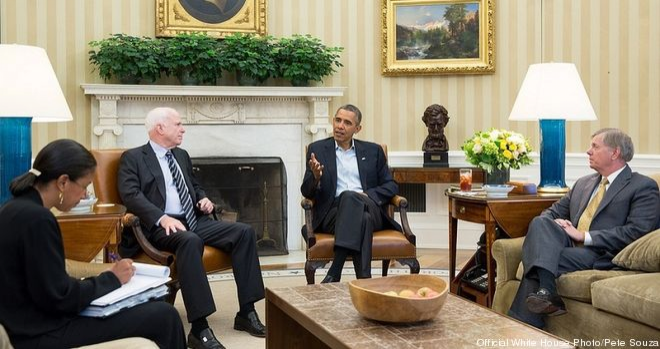McCain Meets Obama, Backs Strike Against Syria

Sen. John McCain, R-Ariz., said after meeting with President Barack Obama Monday that if Congress refuses to authorize military action in Syria, it would be "catastrophic because it would undermine the credibility of the United States and the president of the United States."
McCain said the nation’s global credibility would be "shredded" if Congress blocks a president after he has already committed to military action, Talking Points Memo reported.
Sen. Lindsey Graham, R-S.C., who also took part in the White House meeting, said he and McCain would like to see a more sustained military effort rather than a quick missile strike, but that he intended to support the authorization plan. Graham said "a pretty solid plan" was emerging from the administration "upgrade the opposition" and to "degrade" Assad's regime. "We don't want endless war... We want sustainable security. And Syria is a cancer that's growing in the region."
"I think they're going to have to work very hard," McCain said, to ensure the resolution passes Congress.
Meanwhile Monday, Secretary of State John Kerry told House Democrats in a 70-minute conference call that the decision whether to authorize a military response to the Assad's regime's use of chemical weapons was a "Munich moment" for the United States. Minority Leader Nancy Pelosi, D-Calif., voiced support for the White House position on the call, but sources told Politico that not all members were accepting Kerry's message. Rep. Rick Nolan of Minnesota and Kerry reportedly got into a "heated exchange" when Nolan challenged evidence the Obama administration presented last week to support its claim that the Assad regime used chemical weapons.
The French prime minister presented an intelligence report to his parliament Monday stating that the chemical attack "could not have been ordered and carried out by anyone but the Syrian government."
On Tuesday, the Senate Foreign Relations Committee will hear the secretaries of state and defense make the president’s case for intervention in Syria Tuesday, the panel announced Monday.
Kerry and Defense Secretary Chuck Hagel will appear before the panel to make Obama’s case for “limited, narrow” strikes in retaliation for Syrian President Bashar Assad’s alleged use of chemical weapons against Syrian civilians. American officials say that more than 1,000 Syrians died in the attacks, including hundreds of children.
The committee will hold another classified hearing Wednesday that will be closed to the press and public, Politico reports.
McCain and Graham released a joint statement Saturday that expressed their support for military action while cautioning that they believe isolated military strikes don't go far enough to deter the Assad regime.
"However, we cannot in good conscience support isolated military strikes in Syria that are not part of an overall strategy that can change the momentum on the battlefield, achieve the president's stated goal of Assad's removal from power, and bring an end to this conflict, which is a growing threat to our national security interests," the statement read. "Anything short of this would be an inadequate response to the crimes against humanity that Assad and his forces are committing."
The Foreign Relations Committee is set to consider a revised measure authorizing military force in Syria. When it will vote on the resolution, and its final wording, are still unclear. Senate Democratic aides said a panel vote may come later in the week, with the resolution reaching the Senate floor by early next week.
Sens. Robert Menendez, D-N.J., and Bob Corker, R-Tenn., the chairman and ranking member of Foreign Relations, have already endorsed limited U.S. action against the Assad regime. Democratic members Sens. Dick Durbin of Illinois, Ben Cardin of Maryland and Chris Coons of Delaware back that position as well, but other Democrats have yet to take a stand.
Republicans on the committee range from McCain, who has criticized Obama for not going further and using America’s military power to force Assad’s overthrow, to Rand Paul of Kentucky, a staunch anti-interventionist.
The Democratic-controlled Senate looks much more likely to go along with Obama than the GOP-run House, where dozens of members on both sides of the aisle have either come out in opposition to Obama’s call for military strikes against Syria, or look like they could so.
Corker also warned during an interview on CNN that getting enough votes in Congress to pass a Syria resolution would be “problematic,” and he urged Obama to use “every ounce of political capital that he has to sell this.”
© Copyright IBTimes 2024. All rights reserved.





















